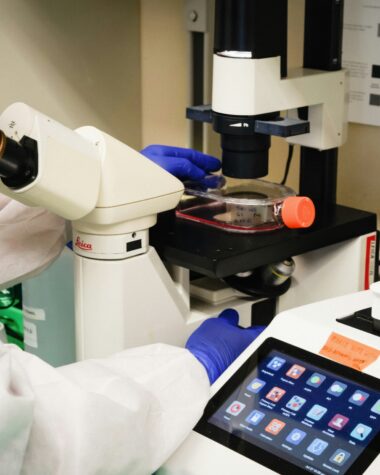Candel Therapeutics, Inc. (NASDAQ:CADL) is a clinical-stage biopharmaceutical company pioneering the next generation of cancer immunotherapies by harnessing the power of viral gene therapy. Headquartered in Needham, Massachusetts, Candel is dedicated to developing multimodal biological immunotherapies that activate the immune system to recognize and destroy cancer cells, aiming to deliver long-lasting protection against tumor recurrence and metastasis. Founded on decades of research in oncology and immunology, the company has built a unique pipeline centered around two proprietary viral platforms—each designed to turn tumors into their own vaccine factories. By delivering therapeutic genes directly into the tumor microenvironment, Candel’s approach stimulates both local and systemic immune responses, creating a personalized anti-tumor effect that is scalable, targeted, and less toxic than traditional cancer treatments.
At the heart of Candel’s innovation is its lead therapeutic candidate, CAN-2409, a first-in-class adenoviral-based immunotherapy engineered to generate in situ vaccination within solid tumors. CAN-2409 is currently being evaluated in multiple late-stage clinical trials, including a pivotal Phase 3 study for localized prostate cancer and a planned Phase 3 trial for non-small cell lung cancer (NSCLC). Unlike systemic checkpoint inhibitors or chemotherapy, CAN-2409 is administered directly into the tumor, where it introduces a gene encoding a prodrug-activating enzyme. Once activated by a prodrug, the therapy selectively kills cancer cells while releasing tumor-associated antigens that help train the immune system to recognize and attack remaining cancer cells throughout the body. This mechanism positions CAN-2409 as a potential backbone therapy for a range of solid tumors, with strong evidence of synergy when combined with existing immuno-oncology treatments.
Candel’s second major program, CAN-3110, is an oncolytic herpes simplex virus (HSV)-based therapy designed for the treatment of recurrent high-grade glioma, one of the most aggressive forms of brain cancer. CAN-3110 leverages a replication-competent HSV backbone that selectively targets cancer cells while sparing normal tissue, triggering a potent local immune response in the brain’s tumor environment. Interim data from early-phase studies have shown encouraging signs of immune activation and prolonged survival in glioma patients, validating the platform’s potential to address other hard-to-treat tumors in the future. The program has been supported by academic collaborations and funding from organizations such as the Break Through Cancer foundation, underscoring its importance in tackling diseases with few therapeutic options.
Beyond its lead programs, Candel continues to expand its discovery pipeline through its proprietary enLIGHTEN platform, which uses data analytics and advanced biological modeling to design next-generation viral immunotherapies with optimized immune activation profiles. This platform-driven approach allows the company to generate a continuous pipeline of candidates tailored to specific tumor types, advancing its long-term goal of building a broad and durable franchise in solid tumor immunotherapy.
Candel’s commitment to innovation is matched by a disciplined financial strategy and a clear focus on execution. In 2025, the company significantly strengthened its balance sheet through a $130 million term loan facility with Trinity Capital Inc., which provided non-dilutive funding to advance its clinical pipeline and prepare for the potential commercialization of CAN-2409 in early localized prostate cancer. With $87.2 million in cash and cash equivalents at the end of the third quarter of 2025, Candel is well-positioned to initiate its Phase 3 NSCLC trial and complete the regulatory submission of a Biologics License Application (BLA) for prostate cancer in 2026. This financial stability ensures that Candel can maintain its strategic focus while pursuing partnerships and collaborations to accelerate development across additional oncology indications.
Under the leadership of Dr. Paul-Peter Tak, a globally recognized immunologist and pharmaceutical executive, Candel has cultivated a world-class team of scientists, clinicians, and industry veterans who share a common vision—to turn deadly cancers into manageable and potentially curable diseases. The company’s leadership emphasizes a patient-centered approach to development, combining scientific rigor with clinical empathy. Candel’s efforts are guided by a philosophy of creating therapies that not only extend survival but also improve quality of life for patients battling advanced cancers.
With a robust clinical pipeline, strong financial foundation, and growing recognition from both investors and the medical community, Candel Therapeutics is emerging as a leading player in the viral immunotherapy space. Its scientific platforms represent a paradigm shift in oncology—moving beyond one-size-fits-all treatments toward precision immunotherapy tailored to each patient’s unique tumor biology. As it advances toward late-stage commercialization, Candel stands at the intersection of biology, technology, and human resilience, poised to redefine how the world approaches cancer treatment in the era of immunogenomic medicine.
Strengthened Balance Sheet: A $130 Million Term Loan Facility Signals Financial Confidence
On October 14, 2025, Candel announced a major financial milestone: a five-year, $130 million term loan facility with Trinity Capital Inc. (NASDAQ: TRIN). This agreement significantly enhances the company’s liquidity, providing non-dilutive capital that bolsters financial flexibility while minimizing shareholder dilution. Under the terms of the deal, Candel immediately drew $50 million upon closing, with access to an additional $80 million contingent on achieving key regulatory, clinical, and operational milestones.
The loan is structured in four tranches — the first $50 million disbursed immediately, two subsequent tranches totaling another $50 million available upon reaching certain milestones, and a final $30 million at Trinity Capital’s discretion. With an interest-only period of 36 months (extendable by another year if Candel achieves a major commercial milestone), the structure gives the company time to advance clinical and regulatory programs before significant repayments begin. The agreement carries an initial interest rate of 10.25% per annum, with flexibility between fixed and floating options.
Candel’s Chief Financial Officer Charles Schoch emphasized that this financing — when combined with the company’s $87.2 million in cash and equivalents as of September 30, 2025 — provides the resources needed to advance its lead programs through late-stage development and pre-commercialization. The funding will specifically support the initiation of a Phase 3 clinical trial of CAN-2409 in NSCLC in the second quarter of 2026 and the expected submission of a Biologics License Application (BLA) for CAN-2409 in localized prostate cancer by late 2026.
This infusion of capital marks a turning point for Candel Therapeutics. It not only ensures that the company can execute its clinical strategy without resorting to heavy equity dilution but also signals growing institutional confidence in the company’s technology and leadership.

CHECK THIS OUT: Corcept (CORT) Skyrockets 1,534% in 10 Years and Immuneering (IMRX) Reports 86% 9-Month Survival in Pancreatic Cancer.
Strategic Focus on High-Value Oncology Markets
Candel’s decision to prioritize CAN-2409’s development in early localized prostate cancer and non-small cell lung cancer underscores its commitment to advancing therapies in two of the largest and most commercially attractive oncology markets. Both indications represent multi-billion-dollar opportunities with unmet needs for safer, more effective, and less invasive treatments.
In localized prostate cancer, Candel is preparing for potential commercialization of CAN-2409 following its anticipated BLA submission in 2026. Clinical data have shown a 30% reduction in disease recurrence or death and a 38% improvement in disease-free survival, outcomes that could significantly impact standard-of-care treatment strategies. Meanwhile, in NSCLC — one of the world’s deadliest cancers — Candel’s viral immunotherapy could become a valuable addition to immuno-oncology combinations, enhancing responses to checkpoint inhibitors or radiation therapy.
Candel’s partnership with Trinity Capital was explicitly designed to ensure the company can pursue these large-scale trials and commercialization efforts without compromise. Rob Lake, Senior Managing Director of Life Sciences at Trinity, praised Candel’s approach, noting that “the company’s strong clinical data and innovative platform position them well to make a real impact for patients facing prostate cancer and NSCLC — both areas with large commercial opportunities and significant unmet medical needs.”
Focused Execution and Portfolio Optimization
Alongside the financing announcement, Candel revealed that it will seek externally funded partnerships for the continued development of CAN-2409 in pancreatic ductal adenocarcinoma (PDAC) — another high-mortality cancer with limited treatment options. While the company’s Phase 2a data in PDAC were promising and earned Orphan Drug Designation from the European Medicines Agency (EMA), management decided to channel internal resources into its two lead indications, prostate cancer and NSCLC, to maximize capital efficiency and accelerate regulatory progress.
This disciplined focus reflects Candel’s portfolio prioritization strategy — advancing programs with the highest near-term commercial potential while leveraging partnerships to continue developing other promising assets without overextending resources.
CEO Dr. Paul-Peter Tak, a seasoned immunologist and industry veteran, noted that the new financing enables the company to “advance breakthrough therapies in two of the largest oncology indications while delivering sustainable value to shareholders.” He also confirmed that the company will continue supporting CAN-3110 for recurrent glioblastoma, a devastating brain cancer, through enabling work for a randomized Phase 2 clinical trial funded in part by the Break Through Cancer foundation.
Institutional Confidence and Long-Term Growth Potential
The financing agreement with Trinity Capital and the advisory support from Jefferies LLC—which acted as Candel’s exclusive financial advisor—signal growing institutional belief in Candel’s long-term potential. The company’s strategy is now fully funded through critical milestones, including its upcoming Phase 3 NSCLC trial and its first commercial launch preparation for CAN-2409 in prostate cancer.
Candel’s management has also demonstrated prudent capital allocation, emphasizing non-dilutive financing to preserve shareholder value. The combined $130 million facility and existing cash reserve position Candel with over $137 million in available liquidity, giving it one of the strongest balance sheets among mid-stage biotech peers. This robust financial position reduces near-term financing risk, allowing the company to maintain momentum toward multiple late-stage catalysts that could dramatically revalue its stock.
Analysts such as H.C. Wainwright have taken notice, assigning Candel a Buy rating with a $23 price target, citing the strength of CAN-2409’s clinical data and its transformative potential in solid tumor immunotherapy. Investor sentiment has mirrored this optimism, with CADL shares rallying sharply on news of positive trial data and regulatory milestones throughout 2025.
Conclusion: A Biotech on the Verge of a Breakthrough
Candel Therapeutics is now entering one of the most pivotal phases in its history — transitioning from a clinical-stage innovator to a potential commercial-stage leader in cancer immunotherapy. Its groundbreaking CAN-2409 program continues to demonstrate robust efficacy across multiple tumor types, while its strengthened financial position through the $130 million Trinity Capital facility ensures the company can advance its programs through pivotal trials and pre-launch activities without dilution pressure.
The company’s sharpened focus on prostate and lung cancer — coupled with ongoing innovation in glioblastoma and pancreatic cancer through partnerships — gives it a diversified yet disciplined development pipeline. Backed by institutional investors, seasoned leadership, and compelling clinical data, Candel Therapeutics stands at the threshold of transforming its science into real-world medical and commercial success.
In short, Candel Therapeutics’ 2025 strategy represents a perfect convergence of innovation, financial strength, and clinical momentum — positioning CADL as one of the most promising small-cap biotechs to watch in the coming years.
READ ALSO: Tiziana (TLSA) Surges 143% in 2025 and Immuneering (IMRX) Reports 86% 9-Month Survival in Pancreatic Cancer.








